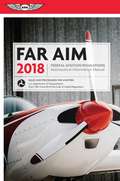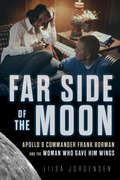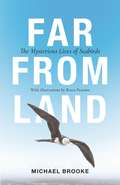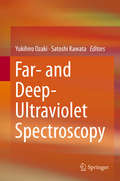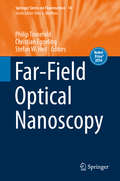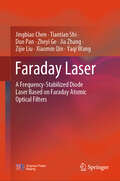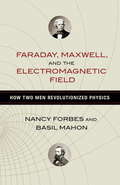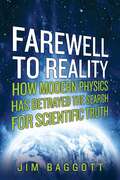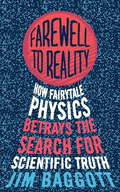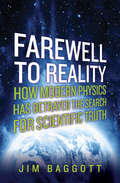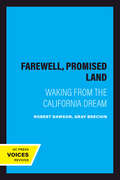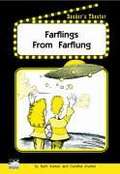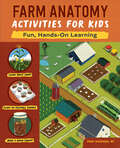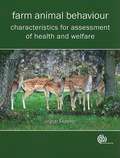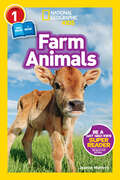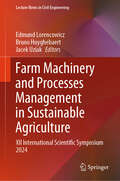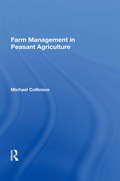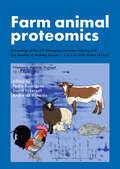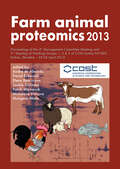- Table View
- List View
Far Aim 2018: Federal Aviation Regulations / Aeronautical Information Manual
by Aviation Supplies Inc. AcademicsThe 2017 FAR/AIM book continues this tradition, containing complete and up-to-date information from Titles 14 and 49 of the Code of Federal Regulations pertinent to General Aviation, Sport Pilots and Flight Instructors, combined with the Aeronautical Information Manual (AIM), and a free email subscription service for you to receive updated information as it is released by the FAA.
Far Side of the Moon: Apollo 8 Commander Frank Borman and the Woman Who Gave Him Wings
by Liisa JorgensenThe decades-long love story of a NASA commander and the leader of the Astronaut Wives ClubFar Side of the Moon is the untold, fully authorized story of the lives of Frank and Susan Borman. One was a famous astronaut—an instrumental part of the Apollo space program—but the other was just as much a warrior. This real-life love story is far from a fairy tale. Life as a military wife was beyond demanding, but Susan always rose to the occasion. When Frank joined NASA and was selected to command the first mission to orbit the moon, that meant putting on a brave face for the world as her husband risked his life for the space race. The pressure and anxiety were overwhelming, and eventually Susan's well-hidden depression and alcoholism finally came to light. Frank had to come to terms with how his "mission above all else" mentality contributed to his wife's suffering. As Susan healed, she was able to begin helping others who suffered in silence from mental illness and addiction.Discover how Frank and Susan's love and commitment to each other is still overcoming life's challenges, even beyond their years as an Apollo commander and the founder of the Astronaut Wives Club.
Far Side of the Moon: The Story Of Apollo 11's Third Man
by Alex Irvine Ben Bishop*Junior Library Guild Selection 2017* A unanimous selection to the 2018 Maverick Graphic Novel List! This graphic retelling of the Apollo 11 moon-landing mission follows astronaut Michael Collins, commander of the lunar orbiter, to the far side of the moon. When the Earth disappears behind the moon, Collins loses contact with his fellow astronauts on the moon’s surface, with mission control at NASA, and with the entire human race, becoming more alone than any human being has ever been before. In total isolation for 21 hours, Collins awaits word that Neil Armstrong and Buzz Aldrin have managed to launch their moon lander successfully to return to the orbiter—a feat never accomplished before and rendered more problematic by the fuel burn of their difficult landing. In this singularly lonely and dramatic setting, Collins reviews the politics, science, and engineering that propelled the Apollo 11 mission across 239,000 miles of space to the moon. Fountas & Pinnell Level U <P><P> <i>Advisory: Bookshare has learned that this book offers only partial accessibility. We have kept it in the collection because it is useful for some of our members. Benetech is actively working on projects to improve accessibility issues such as these.</i>
Far from Land: The Mysterious Lives of Seabirds
by Bruce Pearson Michael BrookeThe lives and activities of seabirds as you’ve never seen them beforeSeabirds evoke the spirit of the earth's wildest places. They spend large portions of their lives at sea, often far from land, and nest on beautiful and remote islands that humans rarely visit. Thanks to the development of increasingly sophisticated and miniaturized devices that can track their every movement and behavior, it is now possible to observe the mysterious lives of these remarkable creatures as never before. This beautifully illustrated book takes you on a breathtaking journey around the globe to reveal where these birds actually go when they roam the sea, the tactics they employ to traverse vast tracts of ocean, the strategies they use to evade threats, and more.Michael Brooke has visited every corner of the world in his lifelong pursuit of seabirds. Here, he draws on his own experiences and insights as well as the latest cutting-edge science to shed light on the elusive seafaring lives of albatrosses, frigatebirds, cormorants, and other ocean wanderers. Where do puffins go in the winter? How deep do penguins dive? From how far away can an albatross spot a fishing vessel worth following for its next meal? Brooke addresses these and other questions in this delightful book. Along the way, he reveals that seabirds are not the aimless wind-tossed creatures they may appear to be and explains the observational innovations that are driving this exciting area of research.Featuring illustrations by renowned artist Bruce Pearson and packed with intriguing facts, Far from Land provides an extraordinary up-close look at the activities of seabirds.
Far- and Deep-Ultraviolet Spectroscopy
by Yukihiro Ozaki Satoshi KawataThis book is the first comprehensive work to be published on far-ultraviolet (FUV) and deep-ultraviolet (DUV) spectroscopy, subjects of keen interest because new areas of spectroscopy have been born in the FUV and DUV regions. For example, FUV spectroscopy in condensed matter has become possible due to the development of attenuated total reflection/FUV spectroscopy. As other examples, DUV surface-enhanced Raman scattering and DUV tip-enhanced Raman scattering have received great attention. Imaging by DUV spectroscopy has also become an area of interest. More recently, FUV and DUV spectroscopy have shown potential for applications in several fields including industry. All these topics are described in this book. Doctoral students and researchers in universities and national research institutes as well as researchers in various industries will find this volume highly useful.
Far-Field Optical Nanoscopy
by Philip Tinnefeld Christian Eggeling Stefan W. HellThis book describes developments in the field of super-resolution fluorescence microscopy or nanoscopy. In 11 chapters, distinguished scientists and leaders in their respective fields describe different nanoscopy approaches, various labeling technologies, and concrete applications. The topics covered include the principles and applications of the most popular nanoscopy techniques STED and (f)PALM/STORM, along with advances brought about by fluorescent proteins and organic dyes optimized for fluorescence nanoscopy. Furthermore, the photophysics of fluorescent labels is addressed, specifically for improving their photoswitching capabilities. Important applications are also discussed, such as the tracking and counting of molecules to determine acting forces in cells, and quantitative cellular imaging, respectively, as well as the mapping of chemical reaction centers at the nano-scale. The 2014 Chemistry Nobel Prize® was awarded for the ground-breaking developments of super-resolved fluorescence microscopy. In this book, which was co-edited by one of the prize winners, readers will find the most recent developments in this field.
Faraday Laser: A Frequency-Stabilized Diode Laser Based on Faraday Atomic Optical Filters
by Jia Zhang Yaqi Wang Jingbiao Chen Tiantian Shi Duo Pan Zheyi Ge Zijie Liu Xiaomin QinThis book systematically introduces the basic principles and technologies of Faraday lasers, starting from the development history and trends of diode lasers. High-precision frequency-stabilized diode lasers are essential instruments for frontier scientific research. They are the core components in the booming fields of quantum precision measurement, time-frequency communication, and atomic physics, and are of great significance to economic development and security construction. It elaborates on the significant advantages of Faraday lasers, based on the Faraday atomic optical filter, including their ability to automatically align with atomic transition lines during startup and their resistance to temperature and current disturbances. Additionally, the book covers the practical applications and significant value of Faraday lasers in devices such as cesium atomic clocks, atomic gravimeters, and underwater optical communication systems. It also explores the future development trends of Faraday lasers. This book is suitable for researchers and engineers in the field of frequency-stabilized diode lasers, and can also be used as a textbook for advanced undergraduate and graduate courses in quantum precision measurement, precision spectroscopy, and related fields. The basis of English translation of this book, originally in Chinese, was facilitated by artificial intelligence. The content was later revised by the authors for accuracy.
Faraday, Maxwell, and the Electromagnetic Field: How Two Men Revolutionized Physics
by Basil Mahon Nancy ForbesThe story of two brilliant nineteenth-century scientists who discovered the electromagnetic field, laying the groundwork for the amazing technological and theoretical breakthroughs of the twentieth centuryTwo of the boldest and most creative scientists of all time were Michael Faraday (1791-1867) and James Clerk Maxwell (1831-1879). This is the story of how these two men - separated in age by forty years - discovered the existence of the electromagnetic field and devised a radically new theory which overturned the strictly mechanical view of the world that had prevailed since Newton's time.The authors, veteran science writers with special expertise in physics and engineering, have created a lively narrative that interweaves rich biographical detail from each man's life with clear explanations of their scientific accomplishments. Faraday was an autodidact, who overcame class prejudice and a lack of mathematical training to become renowned for his acute powers of experimental observation, technological skills, and prodigious scientific imagination. James Clerk Maxwell was highly regarded as one of the most brilliant mathematical physicists of the age. He made an enormous number of advances in his own right. But when he translated Faraday's ideas into mathematical language, thus creating field theory, this unified framework of electricity, magnetism and light became the basis for much of later, 20th-century physics.Faraday's and Maxwell's collaborative efforts gave rise to many of the technological innovations we take for granted today - from electric power generation to television, and much more. Told with panache, warmth, and clarity, this captivating story of their greatest work - in which each played an equal part - and their inspiring lives will bring new appreciation to these giants of science.
Farewell to Reality: How Fairytale Physics Betrays The Search For Scientific Truth
by Jim BaggottFrom acclaimed science author Jim Baggot, a lively, provocative, and &“intellectually gratifying&” critique of modern theoretical physics (The Economist). In this stunning new volume, Jim Baggott argues that there is no observational or experimental evidence for many of the ideas of modern theoretical physics: super-symmetric particles, superstrings, the multiverse, the holographic principle, or the anthropic cosmological principle. These theories are not only untrue, it is not even science. It is fairy-tale physics: fantastical, bizarre and often outrageous, perhaps even confidence-trickery. This book provides a much-needed antidote. Informed, comprehensive, and balanced, it offers lay readers the latest ideas about the nature of physical reality while clearly distinguishing between fact and fantasy. With its engaging portraits of many central figures of modern physics, including Paul Davies, John Barrow, Brian Greene, Stephen Hawking, and Leonard Susskind, it promises to be essential reading for all readers interested in what we know and don''''t know about the nature of the universe and reality itself.
Farewell to Reality: How Fairytale Physics Betrays the Search for Scientific Truth
by Jim BaggottModern physics is heady stuff. It seems that barely a week goes by without some new astounding science story; some revelation about hidden dimensions, multiple universes, the holographic principle or incredible cosmic coincidences. But is it true? What evidence do we have for super-symmetric squarks', or superstrings vibrating in an 11-dimensional space-time? How do we know that we live in a multiverse? How can we tell that the universe is a hologram projected from information encoded on its boundary? Doesn't this sound like a fairy story?In Farewell to Reality Jim Baggott asks whether all that we currently know about the universe is based upon science or fantasy. In addition he wonders whether these high priests of fairy tale physics - such as John Barrow, Paul Davies, David Deutsch, Brian Greene, Stephen Hawking, Michio Kaku, Gordon Kane and Leonard Susskind - are the emperor's latest tailors.Praise for Jim Baggott:A shimmering tour d'horizon. Quantum theory may deny us the possibility of properly comprehending physical reality, but Baggott's account is smart and consoling. Kirkus Reviews.Jim Baggott's inspired - and inspiring - idea of presenting the history of quantum physics in terms of 40 key moments works both as an introduction for the uninitiated and as a refresher for anyone who thinks they know the story. John Gribbin.I never read such a good, comprehensive account as Jim Baggott's...highly recommended. A.N. Wilson.The best popular science book of the year to date by far. popularscience.co.uk
Farewell to Reality: How Fairytale Physics Betrays the Search for Scientific Truth
by Jim BaggottModern physics is heady stuff. It seems that barely a week goes by without some new astounding science story; some revelation about hidden dimensions, multiple universes, the holographic principle or incredible cosmic coincidences. But is it true? What evidence do we have for super-symmetric squarks', or superstrings vibrating in an 11-dimensional space-time? How do we know that we live in a multiverse? How can we tell that the universe is a hologram projected from information encoded on its boundary? Doesn't this sound like a fairy story?In Farewell to Reality Jim Baggott asks whether all that we currently know about the universe is based upon science or fantasy. In addition he wonders whether these high priests of fairy tale physics - such as John Barrow, Paul Davies, David Deutsch, Brian Greene, Stephen Hawking, Michio Kaku, Gordon Kane and Leonard Susskind - are the emperor's latest tailors.Praise for Jim Baggott:A shimmering tour d'horizon. Quantum theory may deny us the possibility of properly comprehending physical reality, but Baggott's account is smart and consoling. Kirkus Reviews.Jim Baggott's inspired - and inspiring - idea of presenting the history of quantum physics in terms of 40 key moments works both as an introduction for the uninitiated and as a refresher for anyone who thinks they know the story. John Gribbin.I never read such a good, comprehensive account as Jim Baggott's...highly recommended. A.N. Wilson.The best popular science book of the year to date by far. popularscience.co.uk
Farewell to Reality: How Modern Physics Has Betrayed the Search for Scientific Truth
by Jim BaggottFrom acclaimed science author Jim Baggot, a pointed critique of modern theoretical physics In this stunning new volume, Jim Baggott argues that there is no observational or experimental evidence for many of the ideas of modern theoretical physics: super-symmetric particles, super strings, the multiverse, the holographic principle, or the anthropic cosmological principle. These theories are not only untrue; they are not even science. They are fairy-tale physics: fantastical, bizarre and often outrageous, perhaps even confidence-trickery. This book provides a much-needed antidote. Informed, comprehensive, and balanced, it offers lay readers the latest ideas about the nature of physical reality while clearly distinguishing between fact and fantasy. With its engaging portraits of many central figures of modern physics, including Paul Davies, John Barrow, Brian Greene, Stephen Hawking, and Leonard Susskind, it promises to be essential reading for all readers interested in what we know and don't know about the nature of the universe and reality itself.
Farewell, Promised Land: Waking from the California Dream
by Robert Dawson Gray BrechinThis title is part of UC Press's Voices Revived program, which commemorates University of California Press’s mission to seek out and cultivate the brightest minds and give them voice, reach, and impact. Drawing on a backlist dating to 1893, Voices Revived makes high-quality, peer-reviewed scholarship accessible once again using print-on-demand technology. This title was originally published in 1999.This title is part of UC Press's Voices Revived program, which commemorates University of California Press’s mission to seek out and cultivate the brightest minds and give them voice, reach, and impact. Drawing on a backlist dating to 1893, Voices Revived</DIV
Farflings From Farflung
by Candice Kramer Pam Hirschfeld Ruth Romer Albert HannerPerform this script about aliens who travel to Earth to learn about gravity.
Farm Anatomy Activities for Kids: Fun, Hands-On Learning (Anatomy Activities for Kids)
by Dawn AlexanderHelp kids ages 8 to 12 discover how awesome and fun farms can beNo matter where you live, you can learn all about the amazing things that happen on farms. Farm Anatomy Activities for Kids combines the joy of hands-on experiments and activities with easy-to-understand lessons that teach you all about farm life.This farm anatomy activity book helps you think more like a farmer and understand how nature, crops, and animals shape the way we live. You'll learn about all the different parts of a farm, the plants and animals you might find there, and how farms create the food you eat and the material for the clothes you wear.Farm Anatomy Activities for Kids includes:Educational lessons—Learn about the various parts of a farm, how they raise plants and animals, and the ways farms connect to your daily life no matter where you live.Ways to play—Try out cool experiments like growing crops without soil or making a mason bee house.Journal prompts—Reflect on what you've learned about farm anatomy with the thoughtful writing prompts paired with each activity.Take kids on an educational journey down to the farm without ever leaving home.
Farm Animal Behaviour
by Ingvar EkesboAnimal behaviour is the basis for ascertaining their welfare and is a topic of ever growing importance. This textbook is organised into three sections covering all major farm animals of the world, both mainstream and specialist: large farm animal species (horses, cattle, swine, sheep and goats), poultry and farmed birds and non-domesticated animals such as deer. Each chapter describes the elements of behaviour of a particular species in a clear and uniform format. Background to domestication, innate and learnt behaviour, social behaviour, mating behaviour, activity patterns, senses, behaviour in the young animal, vision and hearing are all covered for each species. Understanding of ethological knowledge is both a necessary aid for getting correct diagnoses, but also for the assessment of health and welfare in the single animal or a group of animals, making the book valuable for veterinary practitioners as well as students at university and tertiary level.
Farm Animal Welfare Law: International Perspectives on Sustainable Agriculture and Wildlife Regulation (Essentials in Animal Law and Welfare)
by Gabriela Steier Sahana Ramdas Christian Mulgrew de Laire Audrey Amescua Amanda G. Verkest Morgan BoutilierThis book introduces the various aspects of international farm animal protection and wildlife conservation through the lenses of food safety and environmental protection law. Bite-sized chapters focus on a wide range of topics from agrobiodiversity, fishing, and aquaculture to pollinators and pesticides, soil management, industrial animal production, and transportation, as well as international food trade. Animal welfare and biodiversity conservation sit at the core of the selected chapters, each one providing real-world examples to make the complex field easy to understand. Current developments including food safety modernization, blockchain, and COVID-19 considerations are addressed head-on. Farm Animal Welfare Law provides a primer for law school courses and masters’ programs, for practitioners, advocates, and animal enthusiasts alike. Through its emphasis on sustainable food production, this book offers a cutting-edge selection of evolving topics at the heart of the pertinent discourse.
Farm Animals (Readers)
by Joanne MatternAdult and child readers will learn all about adorable farm animals together in this new Co-reader from National Geographic Kids.
Farm Machinery and Processes Management in Sustainable Agriculture: XI International Scientific Symposium 2022 (Lecture Notes in Civil Engineering #289)
by Simone Pascuzzi Francesco SantoroThis volume gathers the latest advances, innovations, and applications in the field of sustainable and smart agriculture, as presented by leading researchers at the XI Farm Machinery and Processes Management in Sustainable Agriculture (FMPMSA), held in Bari, Italy on June 13-15, 2022. The volume covers highly diverse topics, including: management of field and livestock production machinery; management of biomass and agroenergy production; plant protection, soil management and agrochemicals application; smart farming and sustainability; ergonomic, labour organization, pandemic impact; sustainable agriculture in the European Union and other countries. The papers, which are published after a rigorous international peer-review process, highlight numerous exciting ideas that will spur novel research directions and foster multidisciplinary collaboration among different specialists.
Farm Machinery and Processes Management in Sustainable Agriculture: XII International Scientific Symposium 2024 (Lecture Notes in Civil Engineering #609)
by Edmund Lorencowicz Bruno Huyghebaert Jacek UziakThis book gathers the latest advances, innovations, and applications in the field of sustainable and smart agriculture, as presented by leading researchers at the XII Farm Machinery and Processes Management in Sustainable Agriculture (FMPMSA), held in Lublin, Poland, on June 12–14, 2024. The book covers highly diverse topics, including: management of field and livestock production machinery; management of biomass and agroenergy production; plant protection, soil management and agrochemicals application; smart farming and sustainability; ergonomic, labor organization; and sustainable agriculture in the European Union and other countries. The papers, which are published after a rigorous international peer-review process, highlight numerous exciting ideas that will spur novel research directions and foster multidisciplinary collaboration among different specialists.
Farm Management In Peasant Agriculture
by Michael CollinsonFirst published in 1972, Farm Management in Peasant Agriculture remains the only detailed discussion of on-site research techniques for economists working on the development of small-holder agriculture in Africa. Part 1 describes the conditions of the agricultural sector within which the African peasant farmer must operate, and then outlines an approach to farm management tailored to those conditions. Part 2 sets out the research planning and investigation tasks implied by the approach. Survey techniques, as well as the value of a pre-survey for understanding general attributes of a farm system, are reviewed, and alternative data-collection methods are elaborated. Part 3 shows how research data can be used in planning content for extension programs. Dr. Collinson concludes with the details of a planning method that interpolates changes in farm practice into a model of the existing farm system and that projects a sequence of changes, representing a sequence of extension content, on the basis of farmer acceptability.
Farm Prices: Myth and Reality
by Willard W. CochraneThis book deals with the price-income problems of commercial agriculture in the United States. The purpose of this book is to bring the best in modern analysis--information, economic logic, and social theory--to bear on the price-income problems of commercial agriculture.
Farm animal proteomics
by David Eckersall André De Almeida Pedro RodriguesProteomics is a field with growing interest in almost every area of life sciences. Proteomic techniques, along with potential and obtained results have long been key components of biomedical and pharmaceutical research. In agriculture, animal and veterinary research however, use of proteomics is still limited, despite the large number of potential applications. As a result, there is a pressing need for wider use and dissemination of proteomics in animal and veterinary science research. This book meets this need by bridging the gap between experts in the technology of proteomics and those at the forefront of research into many facets of animal physiology and pathophysiology. The book encompasses a wide range of topics: from muscle and meat proteomics to acute phase proteins and proteomics in aquaculture, to name but a few. The book summarily presents the state of the art in farm animal proteomics research in Europe, providing readers with interesting examples of the applications of this set of advanced technologies as well as useful contact details of colleagues with expertise in the field. The book will be of interest to scientists at the cutting edge of animal and veterinary research who are currently, or are considering, analytical investigation and identification of protein in animal tissue and in pathogens in health and disease. Furthermore the book will provide an insight for proteomic specialists in demonstrating the breadth of applications that their technology can have in animal and food research.
Farm animal proteomics 2013
by David Eckersall Mangesh Bhide Saskia Dolinska Elena Bencurova Patrik Mlynarcik Miroslava Vincova André De AlmeidaProteomics may be defined as the large-scale study of the proteome, i.e. a set of proteins being expressed in a certain fluid, tissue, organ or organism. Although still of limited and restricted use in most areas of farm animal and veterinary research, proteomics potential is unequivocal holding a significant promise in applications such as vaccine and drug development, animal product quality, physiology or toxicology. Nevertheless, proteomics use has been growing steadily during the last 2-3 years and, as time goes by; proteomics-based studies are more and more common, not just to scientists but to the general public, unraveling their full potential. This book reflects the will of a group of scientists that merge innovation with excellence of research and to whom the dissemination of knowledge and innovation through cooperation is a key essential point. It will be of interest to scientists at the early stages of their careers as well as to researchers well established in the field and to whom proteomics may be the necessary next step towards more in-depth research activities. By providing a collection of diverse scientific interests, Farm Animal Proteomics 2013 is also a witness to the vitality of the area and the importance it holds to animal and food research, to science, industry, government agencies, the consumer and ultimately the society as a whole.
